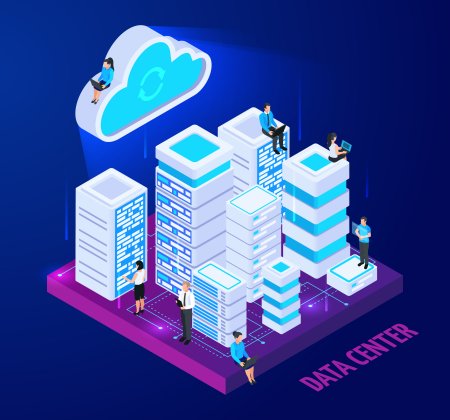Cloud infrastructure refers to the computing, networking, and storage resources necessary for application delivery over an internet-connected network. It includes hardware such as servers and networking equipment and virtualization software that abstracts resources.
Hardware and software in the cloud offer organizations an attractive option to free themselves of purchasing and maintaining their IT infrastructure, especially valuable for companies that require large amounts of processing or storage capacity, such as big data analytics firms.
Software-as-a-Service
Software-as-a-Service, commonly called SaaS, is one of three primary cloud service models alongside IaaS and PaaS. SaaS allows users access to applications via the Internet without needing to install hardware or download software; subscription-based payment for business applications over SaaS provides pay-as-you-go service with flexible monthly subscription models available.
Instead of installing software onto every computer in your organization, SaaS applications are accessible over the Internet from web browsers and mobile apps, with all code bases, customizations, data, updates, etc., residing on one server. Furthermore, its multitenant architecture enables engineers to make maintenance, bug fixes, and updates to the software for multiple customers on just one instance of an application.

SaaS offers numerous advantages to businesses beyond savings on upfront software installation and maintenance costs, including reduced scalability issues and maintenance support expenses. Businesses don't need to worry about scaling; software providers can adjust their systems flexibly according to your business requirements. Furthermore, SaaS vendors take care of hardware management, upgrades, security, and other technical functions, so you don't have to.
Businesses also benefit from flexible payment options and on-demand capacity provided by SaaS vendors. Instead of making a major capital investment upfront, these vendors charge monthly or annual subscription fees based on how much data or seats you use or purchase - making budgeting simpler while freeing IT talent to focus more on innovation for the company.
While SaaS offers many advantages, its flexibility may also present unique challenges. If a service provider experiences an outage, it may impact all subscribers simultaneously and relies on third-party vendors for maintaining software availability and eliminating potential security concerns.
As you evaluate SaaS solutions, look for additional features to increase team productivity. For instance, some SaaS providers provide chatbots or digital assistants to improve customer service; others may provide integrated analytics to inform more informed marketing decisions based on customer behavior; yet others provide monitoring capabilities so you can detect issues before they cause significant downtime and boost productivity.
Storage
Cloud storage offers remote data storage with numerous advantages for businesses, including scaling capacity up or down according to business needs - which helps reduce expenses while supporting business continuity and backup operations. Companies should consider cost or performance implications before opting for cloud solutions, such as paying for dedicated telecommunication links between their provider and service provider or maintaining an in-house backup system.
Cloud storage can also be accessed via colocated cloud computing services, cloud desktop storage gateways, or applications that use its API. To keep costs to a minimum, companies should carefully evaluate upfront and ongoing costs associated with managing an in-house solution while considering whether new telecommunications connections or optical links might be needed to reach their cloud destination.
Cloud storage services employ redundancy to safeguard data against human errors or equipment failure, providing greater redundancy than physical locations can offer. Furthermore, their fast scalability makes them perfect for handling sudden spikes in data volumes.
Some clouds also offer data syncing services, enabling remote employees or collaborative teams working from different places and times to easily access the latest version of files stored across multiple locations. This feature saves both time and effort while making accessing them simpler.
Cloud storage solutions offer business-critical workloads that demand ultra-low latency, availability, and instant scalability with instantaneous responsiveness and the resiliency they need for success. Their rapid scaling features allow enterprises to respond swiftly to changing business conditions for maximum customer service experience.
As part of your evaluation of cloud infrastructure solutions, assessing each vendor's security offerings is critical. A third-party cloud storage provider might not meet federal compliance standards - something some enterprises find unacceptable. HPE stands out with its comprehensive portfolio of products and services, including FedRAMP-certified cloud infrastructure solutions, to give customers the confidence they are working with reliable vendors.
Networking
Cloud networking is a subset of cloud computing that centralizes networking resources hosted by an outside provider (CSP). A typical cloud network typically comprises servers, routers, and firewalls, which enable the network to support various virtual servers, storage services, and networking functions. Cloud networking offers several benefits, including pay-as-you-go real-time features with reduced equipment requirements and more scalable bandwidth capacities.
Primarily, software updates reduce IT infrastructure upgrades and maintenance needs. Instead of waiting days or hours for physical servers to be upgraded, software upgrades can take place almost instantaneously, allowing businesses to focus more on business issues than IT ones.
Cloud networking not only increases flexibility and agility but also strengthens security. Because cloud infrastructure solutions are located remotely, they're more protected against local network attacks - although note that cloud networking relies heavily on having access to a strong and stable Internet connection.
Vendor lock-in can be an issue with cloud networking solutions since an organization will have less control of its network and fewer options should it wish to switch to CSP.
Infrastructure-as-a-Service (IaaS), Platform-as-a-Service (PaaS), and Software-as-a-Service (SaaS). IaaS offers raw computing resources like storage space, network connections, and servers; customers will then provide their application software or platforms on top of these IaaS services.
PaaS is a more advanced solution, offering the full development environment for specific apps or systems, including tools, programming languages, and databases. Hosted by a Cloud Service Provider and sold as a pay-as-you-go subscription model, its only on-premise component is software owned by your organization. CSPs typically manage, optimize and monitor cloud infrastructure through web-based management interfaces to monitor its security, availability, performance, and compliance responsibilities.
Security
Security in cloud infrastructure resembles that found in on-premises infrastructures in that a combination of tools are used to keep sensitive information safe, such as identity and access management (IAM) products for tracking user identities and allocating permissions based on role or sensitivity, encryption being another important means of keeping sensitive data safe in case of breaches or hardware failure.
Cloud-native monitoring tools can also be beneficial in detecting anomalous behavior or suspicious activity in running workloads, helping protect data from insider threats, and ensuring data privacy. Enterprises today often prefer hybrid and multi-cloud environments, which allow them to apply the same security policies and configurations across both on-premises and cloud infrastructure - making these monitoring tools ideal for protecting their sensitive information assets from breaches and breaches.
An endpoint protection solution is also essential to the secure environment of cloud services since most are accessed via a web browser. Therefore, advanced client-side security should be implemented to keep users' endpoints up-to-date and protected from exploits. Look for comprehensive solutions that protect endpoints, servers, and mobile devices through threat detection, firewalls, antivirus protection, and encryption features.
An important consideration in cloud provider selection and management is using an independent third-party service such as Cloud Security Alliance's STAR certification program as a third-party assurance program.
Last but not least is quickly and efficiently detecting and addressing emerging cloud threats. This often involves exploits or vulnerabilities being leveraged against applications, OSes, virtualized environments, and other cloud components by attackers. IDS/IPS tools come into play here by quickly detecting and blocking potential threats before they cause harm; some tools can even automatically patch or shut down systems when they detect them or detect anomalies such as attempted malware or virus installations that require administrator attention.
